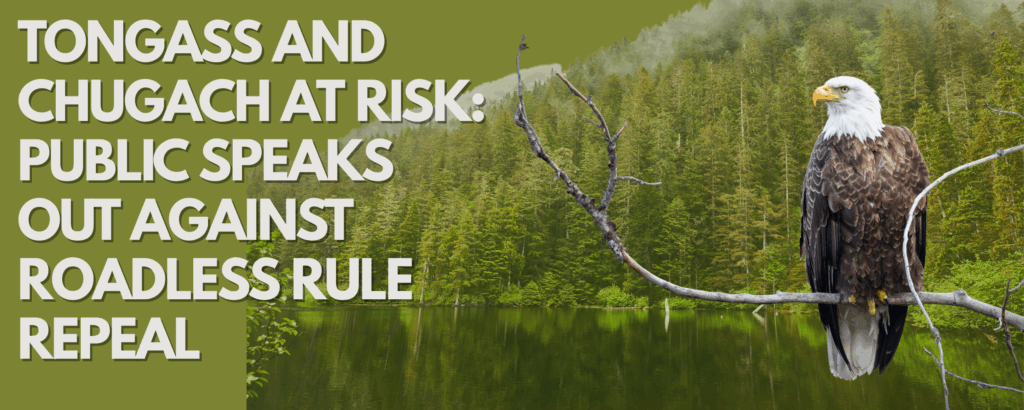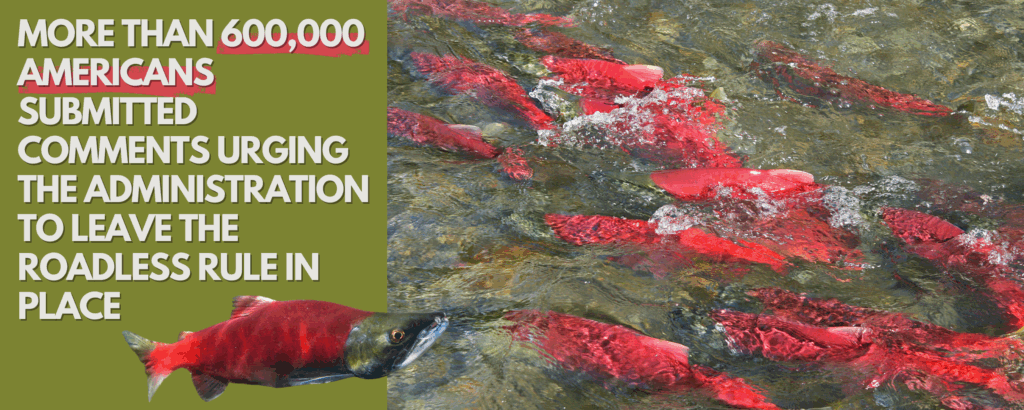Tongass and Chugach at Risk: Public Speaks Out Against Roadless Rule Repeal

We recently saw the close of the public comment period on the Trump administration’s proposed rollback of the Roadless Rule, a cornerstone of U.S. forest conservation. In just three weeks, more than 600,000 Americans submitted comments urging the administration to leave the Rule in place—a remarkable show of support that underscores how deeply people across the country care about public lands. Alaska, home to nearly 22 million acres of national forest, is at the center of this debate, and the stakes couldn’t be higher.
The Roadless Rule, enacted in 2001, has long protected nearly 58 million acres of pristine national forest across the country, prohibiting new road construction in undeveloped backcountry areas. This isn’t just about keeping forests undeveloped; it’s about protecting drinking water, wildlife habitat, recreation opportunities, and the health of ecosystems that millions of Americans rely on. The rule also makes economic sense, as existing roads throughout our national forests face billions of dollars of deferred maintenance. Put simply, it’s been a success for people, public lands, and fiscal responsibility alike.
Yet, the USDA’s proposed rulemaking threatens to dismantle this protection, opening the door to road building, logging, mining, and drilling across the nation—even in Alaska’s Tongass and Chugach National Forests, two of the most ecologically and culturally significant landscapes in the country.
Alaska Wilderness League alone gathered 9,065 petition signatures opposing the rollback, reflecting widespread concern over the administration’s push to prioritize short-term industry profits over long-term public benefit. As Andy Moderow, Senior Director of Policy at Alaska Wilderness League, said:
“No public lands are safe from the Trump administration, not even Alaska’s globally significant forests. Rolling back the Roadless Rule means bulldozing taxpayer-funded roads into irreplaceable old growth forest, and favoring short-term industry profits over long-term, sustainable forest uses. The Roadless Rule is one of the most effective, commonsense conservation protections in U.S. history. Scrapping it would sacrifice Alaska’s public lands to the highest bidder.”
Together, the Tongass and Chugach represent some of the largest intact temperate rainforests on Earth, storing enormous amounts of carbon, supporting Alaska’s fishing and tourism economies, and sustaining Indigenous cultures that have thrived in these landscapes for millennia. In recent decades, the Roadless Rule has helped slow damaging road construction in the Tongass, where past administrations have attempted to prop up the struggling industrial logging industry through taxpayer-subsidized roads.
For Alaska, the stakes are profound. The Tongass—often called “America’s Climate Forest”—absorbs and stores more carbon than any other U.S. forest, while the Chugach provides critical habitat for salmon, bears, and eagles, in addition to supporting robust recreation industries across Southcentral Alaska. The Roadless Rule also protects multiple uses of the Chugach, covering 5.4 million acres from road building and commercial clear-cut logging, including over 500 miles of trails, 3,500 miles of coastline, and the largest contiguous wetlands on the Pacific Coast of North America. These areas offer exceptional opportunities for hiking, hunting, fishing, and birding, and are integral to subsistence and recreation for locals and visitors alike.
Opening these forests to development wouldn’t just threaten ecosystems—it would also burden taxpayers. The U.S. Forest Service already manages over 380,000 miles of roads, a system larger than the entire Interstate Highway System, with an extensive maintenance backlog. At the time the rule was established, the maintenance backlog was estimated to be $8.4 billion, and the rule has helped make that problem worse. More roads mean higher costs for taxpayers, increased wildfire risk, and greater damage to salmon streams and clean water sources.
Alaska’s national forests demonstrate that the Roadless Rule is not inflexible. The forest has a well-functioning exemption process that allows energy projects, power lines, and other community needs while still protecting backcountry landscapes. Claims that repealing the Rule is necessary for wildfire management are misguided: most fires occur near roads, and exemptions exist to address hazardous fuels where needed. Alaskans can safely continue using these exemptions without sacrificing the integrity of our forests.

A Nationwide Advocacy Effort
The massive public response was reinforced by strong congressional and coalition advocacy. As of September 23, the Roadless Area Conservation Act (RACA) had 19 Senate and 59 House cosponsors, reflecting bipartisan support for codifying these protections. Multiple congressional sign-on letters also elevated the Tongass and Chugach, including:
- A June 24, 2025 House letter demanding USDA reinstate the 2001 Roadless Rule (37 signers).
- A September 12, 2025 bicameral letter criticizing the short comment period (56 signers, including House Agriculture and Natural Resources Ranking Members).
- A letter from the Sustainable Energy & Environment Coalition (SEEC) Lands, Waters, and Nature Task Force, urging robust public comment processes across public lands management.
Beyond letters, Alaska Wilderness League and coalition partners engaged directly with lawmakers. Fly-ins brought Indigenous leaders, business owners, and other advocates to Capitol Hill. Meetings with members such as Senators Cantwell (D-Washington), Murkowski (R-Alaska), and Collins (R-Maine), and Representatives Schrier (D-Washington), Gluesenkamp Perez (D-Washington), Lofgren (D-California), Gray (D-California), Ruiz (D-California), Randall (D-Washington), Vasquez (D-New Mexico), and others ensured Alaska’s forests were front and center in the conversation.
The League also helped organize the RACA reintroduction moment and reception, updated and circulated a RACA one-pager, and incorporated Roadless messaging into lobby trainings. Over the summer, staff carried the issue into multiple Hill meetings and blasts, secured mentions of the Tongass in national toolkits and talking points, and pushed former RACA cosponsors to rejoin.
Members of Congress amplified the message publicly as well. Rep. Jared Huffman (D-California) released a statement on June 23 opposing the Roadless Rule rescission, and others, including Rep. Vasquez, highlighted the Tongass directly in social media and press.
A Clear Mandate
This wave of advocacy makes clear that the public and policymakers alike recognize what’s at stake. A diverse coalition of Alaskans—including business owners, hunters, anglers, Tribal governments, scientists, and outdoor enthusiasts—has consistently opposed repealing the Rule. Their voices, along with hundreds of thousands of comments nationwide, show the administration that Americans value their public lands and expect them to be managed responsibly. The Roadless Rule represents commonsense conservation, balancing multiple uses of national forests while protecting them from unnecessary and destructive development.
The Chugach, the Tongass, and national forests across the country are far too important to risk for short-term gains. The public response to the proposed rollback proves that Americans overwhelmingly support keeping these protections in place. From Alaska’s iconic temperate rainforests to forests in the Lower 48, the Roadless Rule ensures that public lands remain a shared resource for generations, protecting clean water, wildlife, recreation, and cultural heritage.
As the USDA moves forward, it should heed this massive outpouring of support. Repealing the Roadless Rule would sacrifice irreplaceable lands, endanger wildlife, burden taxpayers, and undermine the very values that Americans expect from our public lands.
Alaska and the nation’s forests deserve better.
